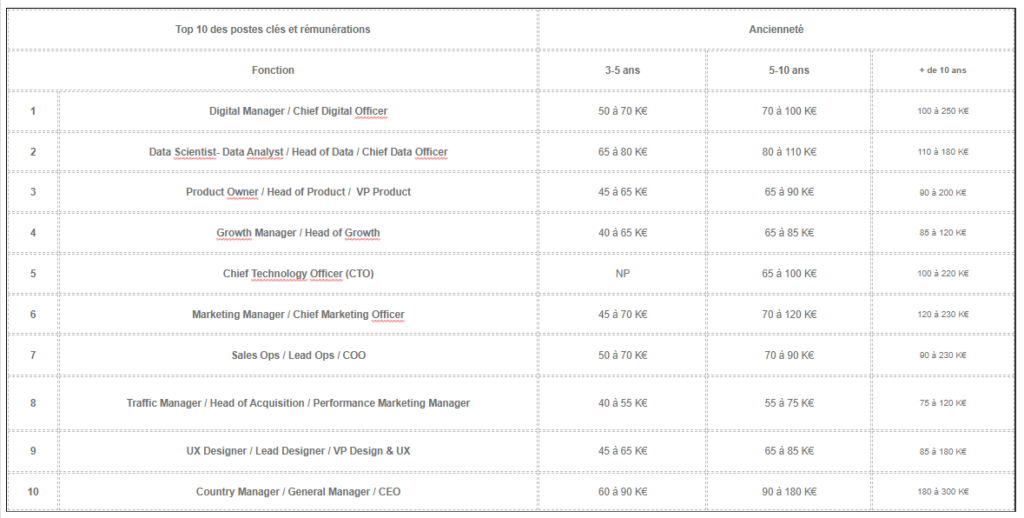Digital Transformation and Compensation – 2020 Barometer
08.11.2019
Grant Alexander Digital Observatory // Salary Barometer 2020
At the heart of corporate digital transformation for the past 10 years—supporting both organizational change and recruitment—
Christophe de Bueil, Director of the Digital Practice at Grant Alexander, leads an observatory dedicated to HR trends and challenges across all professions impacted by these shifts.
Here, he shares the Top 10 key roles for companies engaged in digitalization, along with the salary ranges observed in the Paris region in 2019.
👉 In other regions, salaries show an average discount of 20% compared to these figures.
👉 Variable compensation within the packages presented ranges from 10% to 20%.

What should we know about the digital recruitment market?
The expert view – Christophe de Bueil, Director of the Digital Practice, Grant Alexander
Are the profiles listed in this barometer rare—or very rare?
It depends, of course, on the role. But overall, there is very strong market tension, with the balance tilted in favor of candidates. The war for talent is fierce, particularly around Product, Data, and Growth roles. Two profiles are especially scarce: Product Owners/Heads of Product/VP Product, and Growth Managers/Heads of Growth. This scarcity has put upward pressure on salaries—so much so that in 2019, these roles saw abnormally high inflation.
Which educational backgrounds perform best in these roles?
Unsurprisingly, graduates from top engineering schools (École Polytechnique, Centrale-Supélec) and top business schools (HEC, ESSEC, ESCP, etc.) dominate the candidate pool. Of course, beyond 10 years of experience, educational background matters less—what becomes decisive is professional experience, personality, and proven results.
What are the main challenges for companies hiring these profiles?
Digital professionals relate to work very differently than previous generations. They bring strong qualities: flexibility, adaptability, and an ability to juggle multiple topics without silos. But they also carry traits less common before—most notably impatience. They want things to move fast, to have immediate meaning, and to align with their values.
This makes them very demanding of what the workplace can offer—sometimes without much consideration for reciprocity. The work environment itself now outweighs salary, career prospects, or stability, which used to be the top priorities. They actively seek out dynamic, evolving environments.
Location also plays a key role: for example, La Défense no longer appeals to young graduates, though it once did. Companies must therefore design career paths adapted to digital talent.
How long do these profiles typically stay in a role?
Tenures are shorter than in other sectors. It is not unusual to see new hires leave after only 18 months, often because the organization wasn’t prepared to properly integrate them. The real challenge is retention: creating opportunities for growth, learning, and projection, so these talents don’t look elsewhere too quickly.
Are there sectors or areas that repel digital professionals today?
Yes. We are in the midst of a revolution of usage. Consumers spend with remarkable volatility, which creates dynamism—precisely what digital profiles seek. They gravitate toward start-up clusters in central districts and avoid traditional companies on the outskirts, even nearby.
Recruitment processes add another challenge: they are often too rigid, too slow, and too hierarchical. Many young professionals don’t understand this. They value flat hierarchies and direct access to top management, often possible in start-ups but rare in large corporations. And companies should not imagine that a ping-pong table or a foosball set will be enough to attract them—deeper transformation is required.
How can Grant Alexander’s Athlete Thinking® philosophy support this agile mindset driven by digital transformation?
Athlete Thinking® is both a philosophy and a development tool focused on individuals’ mental components, helping them find their optimal comfort and performance zone in their role. By identifying one’s dominant mental strengths and the levers to activate for peak performance, professionals can develop much like high-level athletes do.
Just as athletes use mental strength to surpass themselves and perform, Athlete Thinking® encourages managers to identify their own levers for self-improvement—while maintaining a sense of enjoyment. This philosophy aligns naturally with the mindset of the new generations, and we believe it can help both companies and digital talent find better ways to work together.
— Christophe de Bueil, November 2019
📧 christophe.debueil@grantalexander.com